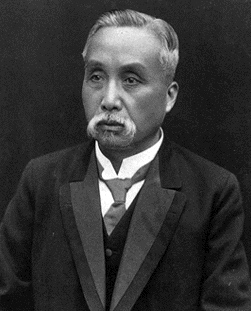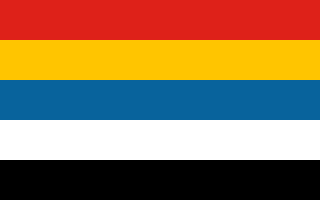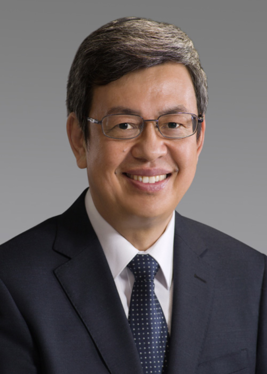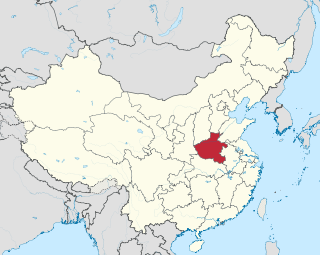
Central Advisory Commission (CAC) was a body of the Communist Party of China that existed during the era of the paramount leadership of Deng Xiaoping. The body was supposed to provide "political assistance and consultation" to the Party's Central Committee; however, as the CAC was a select group of senior Party members, it was often seen as having more authority unofficially than that body.

The Central Foreign Affairs Commission, formerly known as the Central Foreign Affairs Leading (Small) Group is a commission of the Central Committee of the Communist Party of China that exercises general oversight on matters related to foreign affairs. It is currently chaired by Party General Secretary and President Xi Jinping, who is assisted by its office director and Premier Li Keqiang is deputy director. Politburo member Yang Jiechi, and its membership includes officials of minister-rank and above.

Dai Jitao or Tai Chi-t'ao was a Chinese journalist, an early Kuomintang member, and the first head of the Examination Yuan of the Republic of China. He is often referred to as Dai Chuanxian or by his other courtesy name, Dai Xuantang.

The Chairman of the Central Committee of the Communist Party of China was the head of the Communist Party of China (CPC). It was established at the 8th National Congress in 1945 and abolished at the 12th National Congress in 1982, and was succeeded by the General Secretary of the Central Committee. Offices with the name chairman of the Central Executive Committee in 1922–1923 and chairman of the Central Committee existed in 1928–1931. For information about these offices, see the article leader of the Communist Party of China
In the first five years of the People's Republic of China, the Central People's Government of the People's Republic of China was the supreme organ for exercising state power when the National People's Congress was not in session, according to Article 12 of the Common Program of the Chinese People’s Political Consultative Conference .

The Electoral Affairs Commission of Hong Kong is an independent, apolitical and impartial body established under the Electoral Affairs Commission Ordinance. Its main functions include considering or reviewing the boundaries of Legislative Council geographical constituencies and constituencies of the 18 District Councils for the purpose of making recommendations, and overseeing the conduct and supervision of elections and regulating the procedures at an election. It is also responsible for supervision of the registration of electors and the promotional activities relating to registration.

The Central Election Commission is the permanent statutory agency responsible for managing local and national elections in the Republic of China (Taiwan). It is an important agency which carries out elections and enhances the democracy in the country. It is also charged with improving the election legal system, improve the quality of service, reinforce impartiality and independence. It has offices in all counties, cities, and municipalities. It is headed by the Chairman of commissioners or Chief of Commissioners.
The Vice Chairman of the Central Committee of the Communist Party of China was the highest rank under the Chairman within the Communist Party of China (CPC) from 1956 to 1982. The position was phased out after 1982 in order to remove the "Chairman" position from any government posting, resigning it solely to the late Mao.

The 1912 Republic of China Provisional Presidential and Vice-Presidential Elections were the elections held on 15 February and 20 February 1912 in Nanjing for the second provisional President and Vice President of the Republic of China respectively.

The 1913 Republic of China Presidential and Vice-Presidential Elections were the election held on 6 and 7 October 1913 in Beijing for the first official President and Vice President of the Republic of China respectively. The incumbent Yuan Shikai and Li Yuanhong were elected by two houses of the National Assembly.

The 1916 Republic of China Vice-Presidential By-Election were a by-election held on 30 October 1916 in Beijing for the Vice President of the Republic of China due to the vacancy left by incumbent Li Yuanhong as he replaced Yuan Shikai as president after Yuan's sudden death. Feng Guozhang of the Zhili clique won over Lu Rongting of the Old Guangxi Clique in the election.

The 1918 Republic of China Presidential and Vice-Presidential Elections were the elections held on 4 September 1918 in Beijing for the second term of the President of the Republic of China. Xu Shichang was elected by two houses of the National Assembly which were controlled by the Anfu Club formed in the National Assembly election in the same year.

The 1923 Republic of China Presidential Election was the election held on 5 October 1923 in Beijing for the third term of the President of the Republic of China. Zhili warlord Cao Kun won the election through bribery.

The Democratic Party leadership election was held on 12 December 2004 for the 30-member of the 6th Central Committee of the Democratic Party in Hong Kong, including chairman and two vice-chairman posts. It was the first contested chairmanship election in the party's history. Legislative Council member and party's Vice-Chairman Lee Wing-tat defeated the Chan King-ming, succeeding Yeung Sum as the Chairman of the party.

China, as the Republic of China, attended the Summer Olympic Games for the first time at the 1924 Summer Olympics in Paris, France. Far Eastern Games Chinese Competition Committee sent 4 tennis players, Khoo Hooi-Hye, Ng Sze-Kwang, Wei Wing-Lock, and Wu Sze-Cheung to sign up for the tennis competition, with Wei Wing-Lock being the team's captain. The delegation even attended the opening ceremony, but later withdrew from the tennis competition. Nevertheless, this is the first appearance of Chinese people at an Olympic venue.
By-elections for the Ninth Legislative Yuan were held in 2019, two on 27 January and four on 16 March, at Taiwan to elect 6 of the 113 members of the Legislative Yuan for the remaining term until 2020.

The 15th President and Vice President election of Republic of China is scheduled to be held in Taiwan on 11 January 2020. Voters will either elect a new President and Vice President or re-elect the incumbents. The process of presidential primary elections and nominations are likely to be held during the last six months of 2019.
Hsinchu's legislative districts consist of into 2 single-member constituencies, each represented by a member of the Republic of China Legislative Yuan. From the 2020 legislative election onwards, the number of Hsinchu County's seats was increased to 2 due to the county's increase in population, as it exceeded the 315,019 average for each constituency.
Changhua County legislative districts consist of 4 single-member constituencies, each represented by a member of the Republic of China Legislative Yuan.
Tainan City legislative districts consist of 6 single-member constituencies, each represented by a member of the Republic of China Legislative Yuan. From the 2020 election onwards, the number of Tainan's seats was increased from 5 to 6.























